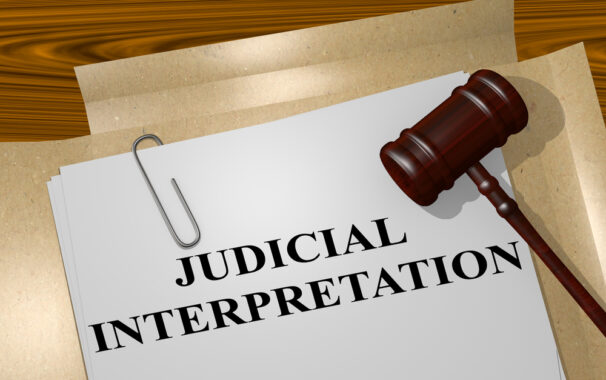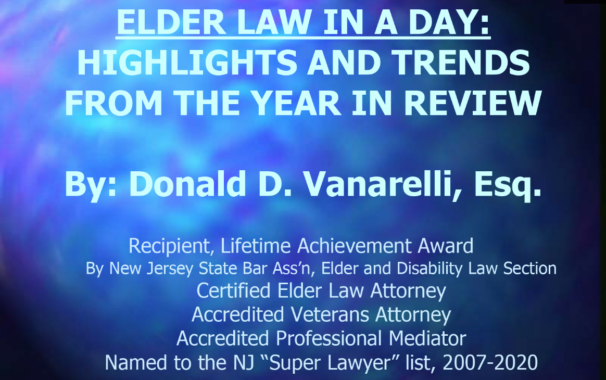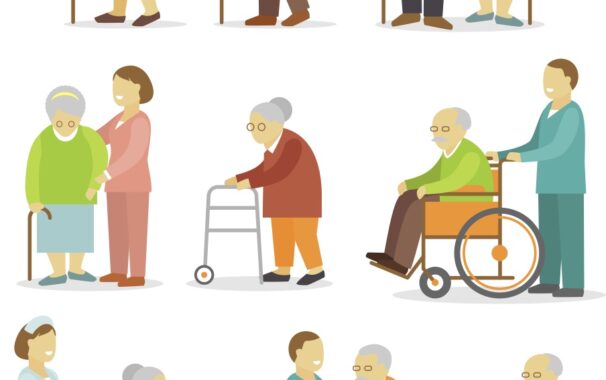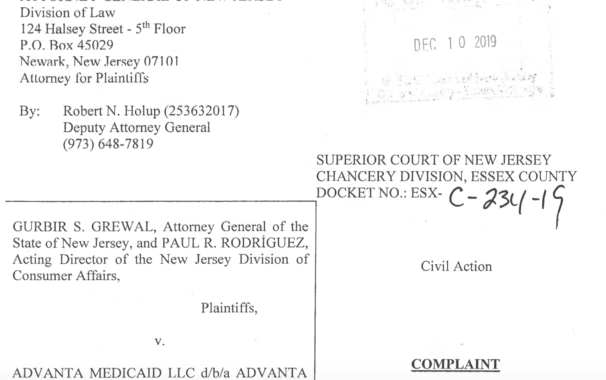
The decedent, Virginia Ogborne, executed a 2016 will leaving her estate to two of her sons, including David, who she named executor. She left only a nominal bequest to another son, James. After James filed a caveat to the will, David filed an Order to Show Cause to strike the caveat and admit the will.. read more →

When she was admitted to a skilled nursing facility, petitioner owned a home. Following her admission, petitioner’s son, who was petitioner’s power of attorney, applied for Medicaid benefits on her behalf. Personnel at the facility informed the son that, in order to attain Medicaid eligibility, petitioner could have no assets. As a result, petitioner’s son.. read more →

B.M. was incapacitated since birth. E.M. and plaintiff L.M. are her siblings. L.M. lived with B.M. for twenty-seven (27) years. and she provided for B.M.’s care, After her mother’s death, B.M. was declared mentally incompetent. L.M. was the appointed guardian of B.M.’s person, and E.M. was the appointed guardian of B.M.’s property. The two guardians.. read more →

The decedent was admitted to the defendant facility, Regency Heritage Nursing and Rehabilitation, in 2013. On the admission date, her daughter accompanied her to the nursing home. The daughter alleged that she was separated from her mother and brought to a conference room, where she was presented with a stack of documents to sign. She.. read more →

Plaintiffs, who were beneficiaries of the decedent’s estate, sued the defendant-executor for misappropriation of estate assets. The parties engaged in mediation, and their settlement agreement was memorialized in a handwritten agreement that the mediator prepared. Thereafter, the plaintiffs’ attorney sent the defendant’s attorney a proposed consent order incorporating the terms of the agreement. When the.. read more →

The estate documents of the decedent, Lois N. DeConca, included a revocable trust naming “Alzheimer’s Association, New Jersey,” with a Denville New Jersey address, as a beneficiary. After her death, her estate filed a Verified Complaint seeking direction from the court regarding which charity was the intended beneficiary: the National Alzheimer’s Association (AA), headquartered in.. read more →

In order to qualify for Medicaid benefits, an applicant may not own more than $2.000 in countable assets. All assets are countable, with few exceptions. Annuities purchased by Medicaid applicants are countable resources unless they are irrevocable and meet certain other requirements. In this case, Jane Cushing purchased a single-premium, immediate annuity from the Croatian.. read more →

The decedent, Anne Jelin, was survived by four siblings, including her brother Frederick. The decedent left a 2013 will, in which she made charitable bequests, bequests to her siblings, excluding Frederick, and bequests to nieces and nephews. Upon his sister’s death, Frederick challenged the will on the basis of lack of testamentary capacity and undue.. read more →

Listed below are the top ten (10) posts on the Vanarelli Law Office blog with the highest readership last year, in 2019. After each hyperlinked blog post title, the original post date is included. Check out the list to see this year’s highlights. Our sincere thanks for taking the time to read our blog! .. read more →

The New Jersey Appellate Division declared a nursing home’s arbitration agreement to be void based upon the agreement’s “dense and meandering first sentence” of more than 200 words, among other problematic features. Estate of Bright v. Aristacare at Cherry Hill. Maureen Bright was discharged from the hospital to Aristacare after undergoing a second leg amputation. Maureen.. read more →

In Hegadorn v. Department of Human Services, the Michigan Supreme Court approved the use of a trust established for the sole benefit of the healthy spouse as a valid method to protect the assets of a married couple when the ill spouse is a Medicaid recipient in a nursing home or other long-term care facility. The.. read more →

On June 27, 2017, D.A., through his Designated Authorized Representative (DAR), applied to the Burlington County Board of Social Services, the county welfare agency (CWA), for nursing home Medicaid benefits. Prior to submitting the Medicaid application, D.A.’s nursing facility requested pre-admission screening (PAS) on D.A.’s behalf in May 2017 to establish D.A.’s clinical eligibility for.. read more →

A nurse’s aide at a senior care facility in southern Minnesota posted a photograph of an elderly patient with on social media with a demeaning and vulgar message did not violate state law meant to protect patient privacy, a state court ruled. Furlow v. Madonna Summit of Byron, Docket No. A19-0987 (Minn. Ct. of Appeals,.. read more →

The decedent’s daughter had been disinherited under her mother’s 2013 Last Will and Testament. Following the decedent’s death, the daughter sought to admit a 2016 draft will, in which she was a beneficiary. The decedent had contacted her attorney beginning in 2015 regarding changes to her 2013 will, and advised the attorney that she did.. read more →

On January 29, 2020, I presented at the 2020 ““Elder Law in a Day” seminar given by the New Jersey Institute for Continuing Legal Education at the New Jersey Law Center in New Brunswick, New Jersey. I presented the case law update, summarizing the most significant legal developments over the past year in the areas.. read more →

A Massachusetts court held that the state is not entitled to recover Medicaid benefits from a community spouse’s annuity. Dermody v. The Executive Office of Health and Human Services (Mass. Super. Ct., No. 1781CV02342, Jan. 16, 2020). Robert Hamel purchased an annuity that named the state as primary beneficiary to the extent any Medicaid benefits are.. read more →

The patient was age 53 when he was transferred to Kindred Hospital. He had been diagnosed with multiple sclerosis and bipolar disorder in his twenties. When he signed the arbitration agreement in issue, he had required 24-hour nursing care for the previous 13 years, although he was not cognitively impaired at the time of the.. read more →

Based on reports from the local police department, Sussex County Division of Social Services, Adult Protective Services (“APS”) opened an investigation into the well-being of 85-year old Sally Dinoia, who was living with her son. Her son actively opposed the investigation, and his efforts included filing a federal complaint against APS and others involved in.. read more →

The decedent died without a will, and without a spouse, domestic partner, or children. Under the New Jersey laws of intestacy, if a decedent dies without a spouse or domestic partner, the decedent’s “descendants” inherit the estate. A “descendant” is defined to include a “child,” which in turn is defined as “any individual, including a.. read more →

R.K. transferred her one-third interest in a house she owned jointly with her daughter and son-in-law to her daughter. Less than five years later, R.K. applied for Medicaid, and asserted that the transfer was exempt under Medicaid’s “caregiver child” exception to the rules prohibiting any transfers of assets within five years of the Medicaid application.. read more →

H.R., who had significant cognitive and functional deficits, was admitted to the Hammonton Center for Rehabilitation and Healthcare (Hammonton Center). The Hammonton Center filed a complaint seeking the appointment of a guardian for H.R. While H.R.’s guardianship was still pending, the Hammonton Center filed a Medicaid application with the Atlantic County Board of Social Services.. read more →

B.F. is an octogenarian who suffered a stroke causing left-side paralysis. B.F. used a wheelchair, and needed assistance with her activities of daily living (ADLs) and instrumental activities of daily living (IADLs). She lived with her long-time friend. When B.F. became eligible for Medicaid, she enrolled in the State’s then-existing Global Options for Long-Term Care.. read more →

A company that was supposed to help consumers complete Medicaid applications for a fee stole more than $300,000 from clients, according to a lawsuit filed by the New Jersey attorney general and the state Division of Consumer Affairs. The State’s complaint, alleging violations of the Consumer Fraud Act, was filed in New Jersey Superior Court in.. read more →

P.P. had been his mother’s legal guardian, and he was executor of her estate. After her death, Medicaid asserted a statutory lien against her estate in the amount of $132,755, representing the amount of correctly paid medical assistance that had been paid on her behalf. P.P. requested a waiver or compromise of the lien based.. read more →

G.M., a 73 year old stroke victim, was diagnosed with Alzheimer’s disease, vascular dementia, schizoaffective and bipolar disorders. After G.M. filed a Medicaid application, the Atlantic County Board of Social Services (Board) notified G.M. that his application was denied because he did not provide necessary information. Several months later, G.M.’s designated authorized representative (DAR) submitted.. read more →
Categories
- Affordable Care Act
- Alzheimer's Disease
- Arbitration
- Attorney Ethics
- Attorneys Fees
- Beneficiary Designations
- Blog Roundup and Highlights
- Blogs and Blogging
- Care Facilities
- Caregivers
- Cemetery
- Collaborative Family Law
- Conservatorships
- Consumer Fraud
- Contempt
- Contracts
- Defamation
- Developmental Disabilities
- Discovery
- Discrimination Laws
- Doctrine of Probable Intent
- Domestic Violence
- Elder Abuse
- Elder Law
- Elective Share
- End-of-Life Decisions
- Estate Administration
- Estate Litigation
- Estate Planning
- Events
- Family Law
- Fiduciary
- Financial Exploitation of the Elderly
- Funeral
- Future of the Legal Profession
- Geriatric Care Managers
- Governmental or Public Benefit Programs
- Guardianship
- Health Issues
- Housing for the Elderly and Disabled
- In Remembrance
- Insolvent Estates
- Institutional Liens
- Insurance
- Interesting New Cases
- Intestacy
- Law Firm News
- Law Firm Videos
- Law Practice Management / Development
- Lawyers and Lawyering
- Legal Capacity or Competancy
- Legal Malpractice
- Legal Rights of the Disabled
- Liens
- Litigation
- Mediation
- Medicaid Appeals
- Medicaid Applications
- Medicaid Planning
- Annuities
- Care Contracts
- Divorce
- Estate Recovery
- Family Part Non-Dissolution Support Orders
- Gifts
- Life Estates
- Loan repayments
- MMMNA
- Promissory Notes
- Qualified Income Trusts
- Spousal Refusal
- Transfers For Reasons Other Than To Qualify For Medicaid
- Transfers to "Caregiver" Child(ren)
- Transfers to Disabled Adult Children
- Trusts
- Undue Hardship Provision
- Multiple-Party Deposit Account Act
- New Cases
- New Laws
- News Briefs
- Newsletters
- Non-Probate Assets
- Nursing Facility Litigation
- Personal Achievements and Awards
- Personal Injury Lawsuits
- Probate
- Punitive Damages
- Reconsideration
- Retirement Benefits
- Reverse Mortgages
- Section 8 Housing
- Settlement of Litigation
- Social Media
- Special Education
- Special Needs Planning
- Surrogate Decision-Making
- Taxation
- Technology
- Texting
- Top Ten
- Trials
- Trustees
- Uncategorized
- Veterans Benefits
- Web Sites and the Internet
- Webinar
- Writing Intended To Be A Will







Vanarelli & Li, LLC on Social Media